Here we are, at the beginning of the New Year! In France, January is the month where people will wish you a Happy New Year and you may hear the French ask:
Avez-vous bien commencé l’année ?
But you won’t hear: Avez-vous bien débuté l’année ?
On the other hand, you will hear both
L’année a bien débuté and
L’année a bien commencé.
So, what’s the difference between commencer and débuter?
The French reference dictionary Le Grand Robert de la langue française gives the following definition for commencer:
“faire la première partie de quelque chose, donner un commencement à quelque chose, être au commencement de quelque chose”
and for débuter:
“jouer le premier coup (dans un jeu), faire ses premiers essais, commencer à faire ses premiers pas dans une carrière ou une activité, commencer”.
So both words mean to start or to begin.
These definitions show how similar in meaning both verbs are. Yet they are not interchangeable mainly because the sentence construction can be different from one verb to the other.
To make things simple, remember that commencer can be used more easily and more often than débuter.
That’s because commencer is both transitive and intransitive while débuter is never transitive.
In other words, you can (though you don’t have to) add a direct object to commencer but not to débuter.
If I may say so, you can commence something but not débute something.
To use débuter, you need another type of complement – an indirect object or an adverbial phrase for instance.
Look at these examples:
- L’année a bien commencé / débuté (the year started well): both are possible because there is no direct object
- Nous avons bien commencé l’année (we started the year well): débuter cannot be used here because of the direct object: we started what? → the year, the year is the direct object.
Here are more examples. Look at the difference in sentence construction and the examples where both commencer and débuter are possible and the examples where débuter cannot be used because there is a direct object:
- En France, l’année scolaire commence / débute en septembre. (In France, the school year begins in September)
- La réunion a commencé / débuté par un tour de table pour se présenter. (The meeting started with all those present introducing themselves.)
- Nous commençons tous nos repas par une entrée. (We begin all our meals with a starter)
- Il a commencé ses études l’année dernière. (He started studying last year).
There you are! You now know the difference between the French verbs commencer and débuter, congratulations! 😉
You can also read this other post from The Language Nook to better understand what preposition to use after the verb commencer – à, de or par.





0 Comments